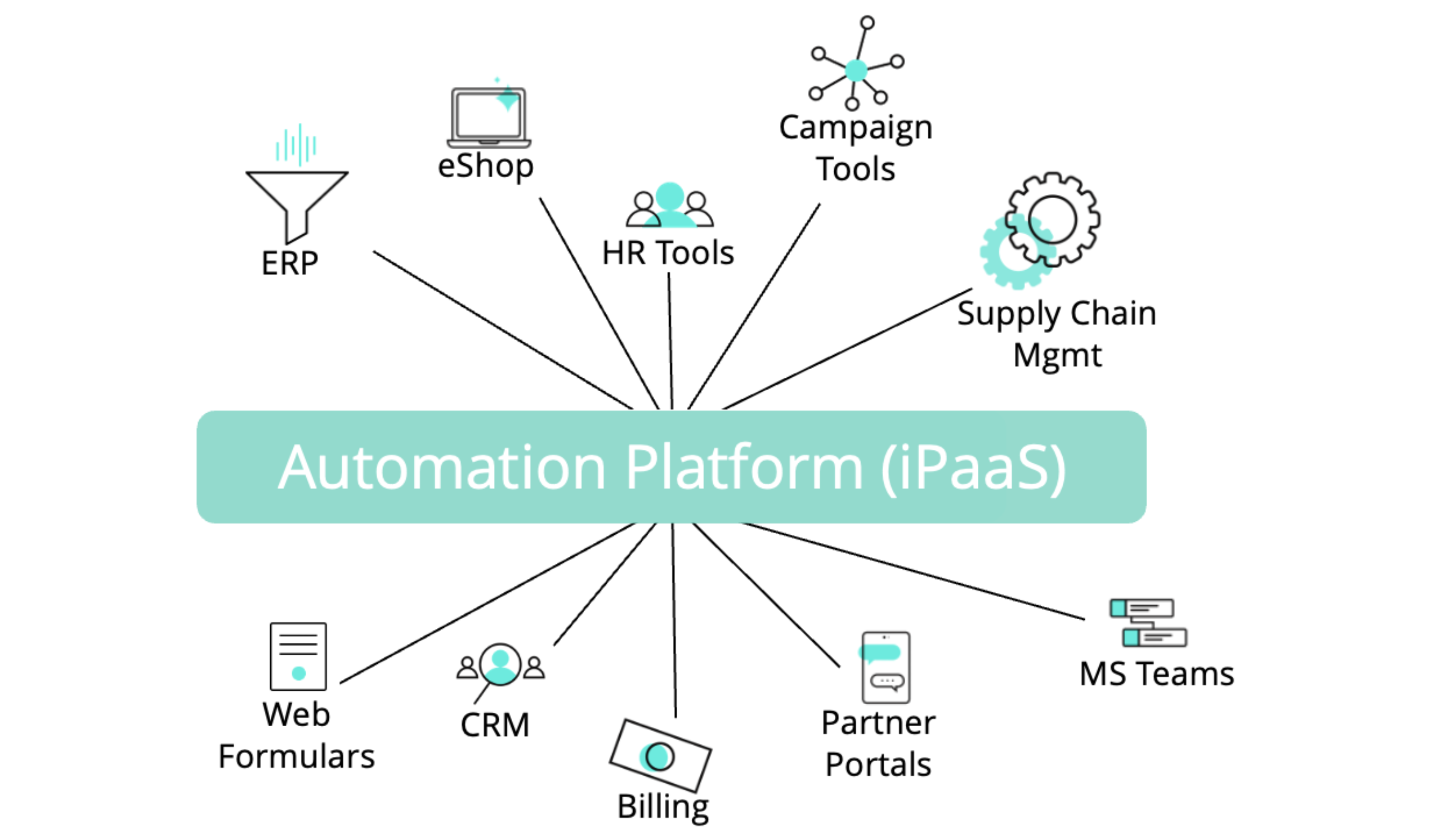Integration Platform as a Service (iPaaS) -Part 1

What is iPaaS?
Integration Platform as a Service (iPaaS) is a cloud service that enables organisations to develop, run and manage integration processes in hybrid multi-cloud environments. With iPaaS, companies can connect applications, data sources, APIs, events and devices to ensure a smooth flow of data and automate business processes. By using iPaaS, companies can not only synchronise data and seamlessly integrate systems, but also automate business processes with the data available. Modern platforms also enable distinctive No Code / Low Code Capability (NCLC) for developing new data integrations, automation and simple apps. With these functions, iPaaS is a powerful solution for solving even the most complex integration and automation requirements in a hybrid multi-cloud environment.
How does iPaaS work?
Automation has been fundamentally transformed by the IT megatrends of cloud computing, software as a service (SaaS), the Internet of Things (IoT), composable IT architecture and AI, and has continuously increased the need for data integration and automation. Approaches such as Robot Process Automation (RPA) generally do not offer the right toolbox to ensure company-wide scaling, as more and more companies are using cloud-based services or Software-as-a-Service (SaaS) to optimise their business processes. The exponential growth of SaaS increases the need for efficient, high-performance data integration within an organisation's IT infrastructure. System discontinuities are the main technical reason why business process automation cannot be introduced across the board in companies. iPaaS offers the possibility of connecting to standard software such as ERP or CRM in a short space of time with predefined connectors. Furthermore, a Software Development Kit (SDK) can be used to develop new connectors, e.g. for a REST-based API. Modern solutions offer a co-pilot to generate a new connector, similar to ChatGPT or Llama, via prompting. This data integration allows processes to be automated end-to-end. Processes such as order-to-cash or record-to-report can thus be automated across system boundaries and any number of integrated systems. The combination of data integration and automation is a key enabler for scaling automation and AI in particular. SaaS-based AI solutions, such as Open AI's Large Language Models, require bidirectional data exchange with internal systems to generate added value in business processes. iPaaS is therefore an essential IT capability for the scalable use of AI in companies.
Another important core function of modern iPaaS is NCLC. The technical complexity is reduced by a drag-and-drop-based, simple user interface so that even digitally savvy business users can automate processes. This expands the circle of users from corporate IT or software developers to specialist departments or process experts and can massively increase the speed of implementation. This also represents a further differentiation from previous automation solutions, as these cannot be used at all in practice or can only be used outside of corporate IT with a great deal of effort. An effective NCLC capability also represents the key differentiation in the iPaaS provider market, which is divided into traditional middleware providers and the recently available NCLC-based automation platforms (see provider comparison).
In summary, iPaaS offers two key features:
-
Wide range of applications: In contrast to existing automation approaches, which usually focus on a specific domain (e.g. data integration or workflow automation), iPaaS can address a variety of scenarios. These include system and data integration, data transformation, end-to-end process automation, external business partner connection, NCLC app and API development.
-
A platform for both business and IT users: NCLC optimised by AI support, many iPaaS platforms enable not only experienced integration specialists to work but also a broader target group. Among others, application developers, SaaS administrators, business analysts and, in some cases, business users (e.g. employees in specialised departments) can benefit from the advantages. This promotes general acceptance among iPaaS buyers, regardless of the size of their IT- organisation.
Who is iPaaS aimed at?
The iPaaS market has expanded substantially in recent years. The technology segment is growing at an annual rate of around 20% and is being utilised by large corporations and increasingly also by SMEs. Most iPaaS providers have now designed and priced their solutions in such a way that they are also accessible to SMEs and offer a positive business case for individual use cases. By merging different domains into one platform, existing solutions can often be consolidated, which brings additional cost benefits. Thanks to the NCLC capability, use cases can be realised in less time and at lower cost compared to previous middleware platforms such as Enterprise Service Bus (ESB) or "non-automation" solutions such as iBPM.
Provider for iPaaS and NCLC Automation
There are a large number of iPaaS providers that can be categorised into two groups. The first group, which primarily includes Workato, SAP, Mulesoft and Microsoft, often has its origins in pure data integration and has continued to develop into automation platforms. The second, related group comes from the no code / low code domain and generally focuses on cloud-based automation (NCLC automation). The second group is not iPaaS in the actual definition, as the data integration capability is much less pronounced. The two segments overlap, as NCLC Automation platforms are developing more and more in the area of data integration and iPaaS is increasingly focussing on no-code / low-code use cases. Both characteristics or groups are increasingly competing with each other when it comes to the automation of simple to moderately complex use cases. The main differentiation in the purpose of use still lies in the respective origins of the two groups, data integration and NCLC (automation), which is particularly noticeable in complex use cases where particularly strong versions of the respective capability are required.
The overview does not include AI copilots, which have already been implemented by all manufacturers in initial versions or are planned on the roadmap. The AI copilots have not yet been effectively implemented by any provider, so that there is clear added value for users. However, the manufacturer roadmaps give justified hope that this will soon change.
NCLC Automation Guide
Outlook
Overall, iPaaS offers a powerful solution for managing complex integration requirements in a hybrid multi-cloud environment. By automating business processes, companies can work more efficiently, reduce costs and increase their competitiveness. iPaaS is therefore an important element of advanced digital transformation and automation and will be an essential IT capability for companies in the future.
While platforms like Zapier, Make, and Power Automate excel in process automation rather than complex data integration, they still offer the necessary data integration capabilities for simple to moderately complex automation tasks. In contrast, providers such as n8n and Workato stand out as versatile solutions capable of handling both data integration and process automation, making them ideal for tackling complex use cases that span across both domains.
More on iPaaS and the other providers from the data integration group follows in the second part of our large iPaaS guide.


-1.png)
.png)
